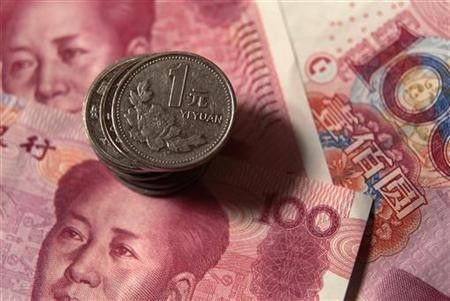China plans to mop up bank liquidity

China has ordered banks to include their margin deposits in required reserves at the central bank to mop up excessive liquidity, banking sources said on Friday, the latest move in Beijing's campaign to rein in worrisome inflation.
Commercial banks will be required to include margin deposits paid by their clients to secure the issuance of banker's acceptance, letters of guarantee and letters of credit in their required reserves.
Such deposits amounted to 4.4 trillion yuan ($688.6 billion) at the end of July, according to central bank data.
It was not immediately clear by how much additional money banks would have to set aside as reserves, but the actual amount would vary from bank to bank.
We estimate that the step could lock up about 800 billion yuan in bank liquidity, said one banking analyst, who declined to be identified.
Some banks have received the order notice from the People's Bank of China, which requires them to pay deposits to the central bank in batches, the sources said. One of the sources said they had reviewed the central bank notice.
The Big Four banks -- Industrial and Commercial Bank of China (1398.HK), Bank of China (3988.HK), China Construction Bank (0939.HK), Agricultural Bank of China (1288.HK) -- and the national postal bank will start paying deposits to the central bank from September 5, according to sources.
Other banks will start paying from September 15.
The central bank was not immediately available for comment.
NOT LET-UP IN INFLATION BATTLE
Chinese leaders still view inflation as the primary enemy, repeatedly stressing that controlling price pressures remained the top priority, even as economic growth is slowing.
China's annual inflation in China hit a three-year high of 6.5 percent in July.
Chinese policymakers are still worried about inflation risks and they face a tough job in controlling liquidity as Western countries maintain loose monetary policies, said Lu Zhengwei, senior economist at Industrial Bank in Shanghai.
Analysts say the latest policy move could hit local stocks and bonds although the central bank was seeking to limit the market impact by ordering banks to pay deposits in a step-by-step way.
Nevertheless, the move could help ease pressure for the central bank to further hike reserve requirement ratio (RRR).
China's central bank has raised bank RRR nine times since late 2010, taking the ratio to a record 21.5 percent for the country's biggest banks.
On top of that, the central bank has raised interest rates five times since last October. Most analysts believe the room for further policy tightening is limited.
The move shows that the chances of raising bank reserve requirement ratios are small this year, Lu added.
Capital Economics said in a research note that it had previously expected two 50 basis point RRR hikes later this year in order to sterilize the central bank's foreign currency interventions.
Our suspicion is that this change in the rules, if it takes place, makes those hikes much less likely, it said.
($1 = 6.390 Chinese Yuan)
© Copyright Thomson Reuters 2024. All rights reserved.





















